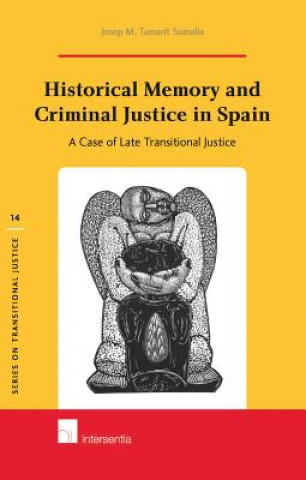
Kód: 02167353
Historical Memory and Criminal Justice in Spain
Autor Josep M Tamarit Sumalla
The Spanish transition from the Franco regime to democracy has not been a very popular subject amongst researchers examining transitional justice at the international level. However, Spain presents certain peculiarities that make ... celý popis
- Jazyk:
 Angličtina
Angličtina - Vazba: Pevná
- Počet stran: 250
Nakladatelství: Intersentia Ltd, 2013
- Více informací o knize

2886 Kč
Dostupnost:
50 % šance Máme informaci, že by titul mohl být dostupný. Na základě vaší objednávky se ho pokusíme do 6 týdnů zajistit.
Máme informaci, že by titul mohl být dostupný. Na základě vaší objednávky se ho pokusíme do 6 týdnů zajistit.Prohledáme celý svět
Mohlo by se vám také líbit
-

Oxford Reader's Companion to Conrad
1305 Kč -

I Was Wrong
1424 Kč -

Fly away Home
248 Kč -

Nature of Mathematics
8047 Kč -

Judge Anderson: The Psi Files Volume 05
543 Kč -

Frýdberk
56 Kč -

CHRONIQUES ITALIENNES
301 Kč
Dárkový poukaz: Radost zaručena
- Darujte poukaz v libovolné hodnotě a my se postaráme o zbytek.
- Poukaz se vztahuje na celou naši nabídku.
- Elektronický poukaz vytisknete z e-mailu a můžete ihned darovat.
- Platnost poukazu je 12 měsíců od data vystavení.
Informovat o naskladnění knihy
Zadejte do formuláře e-mailovou adresu a jakmile knihu naskladníme, zašleme vám o tom zprávu. Pohlídáme vše za vás.
Více informací o knize Historical Memory and Criminal Justice in Spain
Nákupem získáte 289 bodů
 Anotace knihy
Anotace knihy
The Spanish transition from the Franco regime to democracy has not been a very popular subject amongst researchers examining transitional justice at the international level. However, Spain presents certain peculiarities that make it an interesting case in which to explore comparative law and sociology. It has sometimes been seen as a model of peaceful transition, but has also been labelled as an example of an "amnesic" transition to a democratic system in which victims' rights, justice and truth were forgotten. In contrast to other transitions, demands of justice were not expressed during what was the purely transitional period, but they have been on the increase since then. That is why, in this case, we can speak of "post-transitional justice" or, more properly, of "late transitional justice". This book analyses, above all, the laws, policies and judicial decisions adopted in Spain that were related to the construction of the past and could therefore be understood as measures of transitional justice. By comparing this experience with transitional decisions adopted in other countries, the book highlights the main features of the Spanish case and the lessons that can be learned from it. Measures adopted during the transitional period, such as the amnesty and subsequent decisions aimed at giving some kind of partial reparation to the victims of the repression, are here studied. Demands for reviewing the past, the 2007 Act of Historical Memory, and the controversial use of criminal justice are also considered. Criminal Law is hardly applicable to the facts of the past, but the purely amnesic option can no longer be defended. Therefore, the author proposes a plan of action including different measures, such as the creation of a commission of memory, which would be in charge of investigating not only violent crimes or torture, but also other related crimes, including child abduction and politically motivated unlawful adoptions and those perpetrated in a systematic way during the Dictatorship. A victim-centred approach requires ensuring that each victim has the right to be considered on the basis of his or her own suffering, needs and rights and not as a member of a large group.
 Parametry knihy
Parametry knihy
Zařazení knihy Knihy v angličtině Law Laws of Specific jurisdictions Criminal law & procedure
2886 Kč
- Plný název: Historical Memory and Criminal Justice in Spain
- Autor: Josep M Tamarit Sumalla
- Jazyk:
 Angličtina
Angličtina - Vazba: Pevná
- Počet stran: 250
- EAN: 9781780681436
- ISBN: 1780681437
- ID: 02167353
- Nakladatelství: Intersentia Ltd
- Hmotnost: 508 g
- Rozměry: 243 × 163 × 17 mm
- Datum vydání: 30. May 2013
Oblíbené z jiného soudku
-
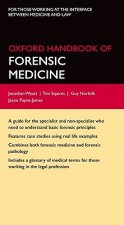
Oxford Handbook of Forensic Medicine
1196 Kč -
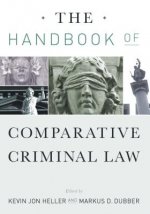
Handbook of Comparative Criminal Law
3116 Kč -

Strafprozessordnung StPO
678 Kč -

Paragraph - Strafrecht
447 Kč -

Dictionary of Law Enforcement
384 Kč -
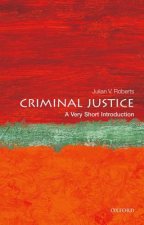
Criminal Justice: A Very Short Introduction
250 Kč -

Jeremy Hutchinson's Case Histories
441 Kč -

In Your Defence
269 Kč -

Criminal Interrogation And Confessions
2984 Kč -

Just Mercy
312 Kč -

On Western Terrorism
513 Kč -

Law Express: Criminology
460 Kč -

Dead Man Walking
396 Kč -

Understanding Criminal Law
950 Kč -

EU Criminal Law after Lisbon
3158 Kč -

Criminal Law
1488 Kč -

Bureau and the Mole
370 Kč -

Fifa 22
365 Kč -
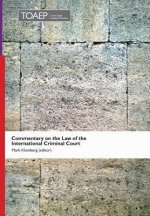
Commentary on the Law of the International Criminal Court
974 Kč -

Just Mercy (Movie Tie-In Edition)
407 Kč -

Investigation of Fraud and Economic Crime
1526 Kč -

Comparative Criminal Justice
1488 Kč -

Forensic Art Essentials
2842 Kč -
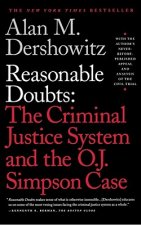
Reasonable Doubts
495 Kč -

Typology of Criminal Personality
557 Kč -

Archival Politics of International Courts
3157 Kč -

European Federal Criminal Law
2495 Kč -

Strafgesetzbuch (StGB)
328 Kč -
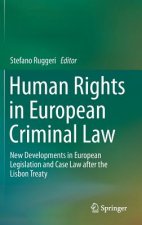
Human Rights in European Criminal Law
3313 Kč -

Life Imprisonment
2245 Kč -

Getting Away with Murder
1065 Kč -

Age of Culpability
1831 Kč -

Ouija Board Jurors
852 Kč -

Road Traffic Law
1410 Kč -

Oxford Handbook of Organized Crime
6104 Kč -

Summer for the Gods
473 Kč -

European Criminal Law
6296 Kč -

European Criminal Law
3457 Kč -
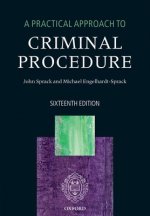
Practical Approach to Criminal Procedure
3243 Kč -

Name of the Devil
252 Kč -

Criminology
3267 Kč -
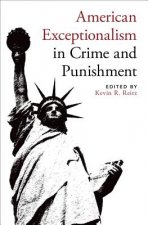
American Exceptionalism in Crime and Punishment
3171 Kč -

Crime and Punishment
1512 Kč -

Impact of Plea Bargaining on the Criminal Justice Delivery
1003 Kč -

Doing Research on Crime and Justice
1517 Kč -

Civil Forfeiture of Criminal Property
4071 Kč -

Training Course in Questioned Handwriting & Document Examination
7708 Kč -

Blackstone's Police Investigators' Q&A
801 Kč -

Criminal Law
12499 Kč
Osobní odběr Praha, Brno a 12903 dalších
Copyright ©2008-24 nejlevnejsi-knihy.cz Všechna práva vyhrazenaSoukromíCookies


 Vrácení do měsíce
Vrácení do měsíce 571 999 099 (8-15.30h)
571 999 099 (8-15.30h)